.png)
This comprehensive course provides an in-depth introduction to the essential aspects of Aircraft Rescue and Firefighting (ARFF). Students will delve into the fundamental principles of fire behavior, gaining a solid understanding of how fires propagate and evolve in various aircraft-related scenarios.
Additionally, participants will familiarize themselves with the specialized equipment utilized in ARFF operations, including firefighting agents, foam systems, and rescue tools. Through a combination of theoretical instruction and practical exercises, students will develop the necessary skills and knowledge to effectively respond to aircraft emergencies, ensuring the safety of passengers, crew members, and airport personnel.

In this hands-on course, participants will learn the ins and outs of operating and maintaining ARFF vehicles. From driving techniques to routine maintenance tasks, students will gain proficiency in the safe and efficient operation of ARFF vehicles in emergency situations. Additionally, participants will learn how to troubleshoot common issues and perform preventive maintenance to ensure the reliability and readiness of ARFF vehicles at all times.
Through practical exercises and simulated scenarios, students will develop the skills and confidence needed to navigate challenging environments and effectively respond to aircraft emergencies.
.png)
This course focuses on the implementation of the Incident Command System (ICS) in airport emergency situations. Participants will learn about the structure and principles of ICS, as well as the roles and responsibilities of key personnel within the incident command structure.
Emphasis will be placed on effective communication, coordination, and decision-making processes during emergency response operations. Through case studies and simulations, students will have the opportunity to apply ICS principles in realistic scenarios, preparing them to lead and manage emergency response efforts effectively.

In this course, students will gain a comprehensive understanding of different aircraft types, their systems, and potential hazards associated with aircraft incidents. Participants will learn to identify key components of various aircraft, including fuel systems, electrical systems, and emergency exits.
Additionally, students will learn to recognize common hazards and risks present in aircraft emergencies, such as fire, smoke, and structural damage. Through interactive learning activities and case studies, students will develop the knowledge and skills needed to assess risks effectively and implement appropriate mitigation measures in aircraft-related emergencies.

In this course, students will gain a comprehensive understanding of different aircraft types, their systems, and potential hazards associated with aircraft incidents. Participants will learn to identify key components of various aircraft, including fuel systems, electrical systems, and emergency exits.
Additionally, students will learn to recognize common hazards and risks present in aircraft emergencies, such as fire, smoke, and structural damage. Through interactive learning activities and case studies, students will develop the knowledge and skills needed to assess risks effectively and implement appropriate mitigation measures in aircraft-related emergencies.
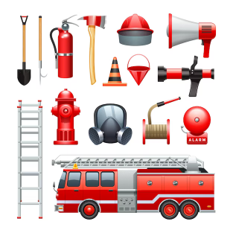
Participants in this course will receive comprehensive training in the use of specialized tools and equipment used in aircraft rescue and firefighting operations. From firefighting agents and cutting tools to rescue devices and protective gear, students will learn how to properly handle and deploy a variety of equipment in emergency situations.
Through hands-on exercises and simulations, students will develop proficiency in using equipment effectively to extinguish fires, rescue occupants, and mitigate hazards. Additionally, students will learn best practices for equipment maintenance and inspection to ensure operational readiness at all times.
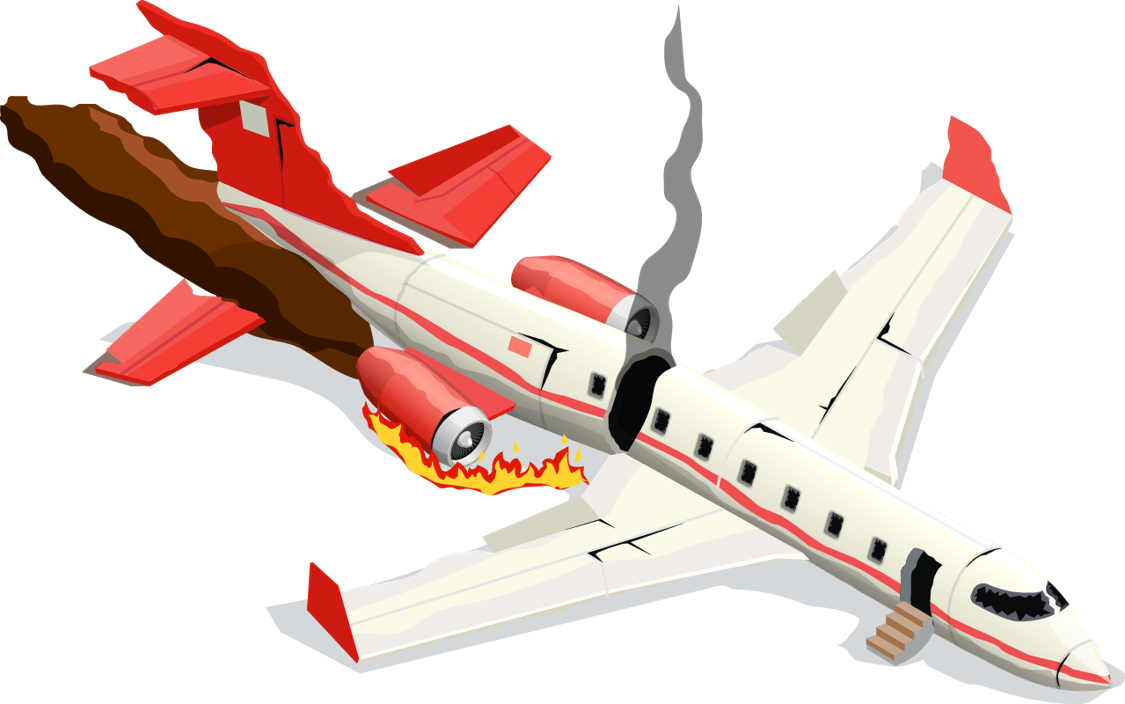
This course explores the dynamics of aircraft crashes and their impact on structural integrity. Students will learn about the forces involved in aircraft accidents, including impact forces, fire dynamics, and structural failures.
Additionally, participants will gain insights into the behavior of different aircraft materials and components under stress, as well as the effects of fire on structural integrity. Through case studies and simulations, students will develop a deeper understanding of the factors contributing to aircraft crashes and the challenges involved in responding to such incidents effectively.
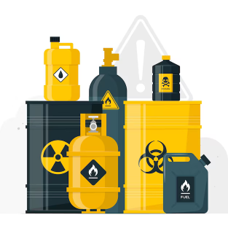
In this course, students will learn to identify and respond to hazardous materials incidents in the context of aircraft rescue and firefighting operations. Participants will gain an understanding of the types of hazardous materials commonly encountered at airports, including fuel spills, chemical leaks, and cargo hazards.
Additionally, students will learn about the potential health risks associated with hazardous materials exposure and the importance of implementing appropriate containment and mitigation measures. Through case studies and practical exercises, students will develop the knowledge and skills needed to safely and effectively manage hazardous materials incidents in the airport environment.
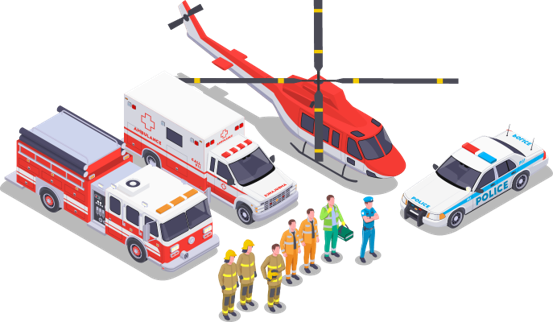
This course focuses on the development and implementation of airport emergency plans to ensure effective preparedness and response to various emergency scenarios. Participants will learn about the key components of an airport emergency plan, including risk assessment, emergency response procedures, and communication protocols.
Topics covered will include conducting vulnerability assessments, establishing emergency response teams, and coordinating with external agencies. Through practical exercises and simulations, students will have the opportunity to apply emergency planning principles to real-world scenarios, enhancing their readiness to respond to emergencies effectively.
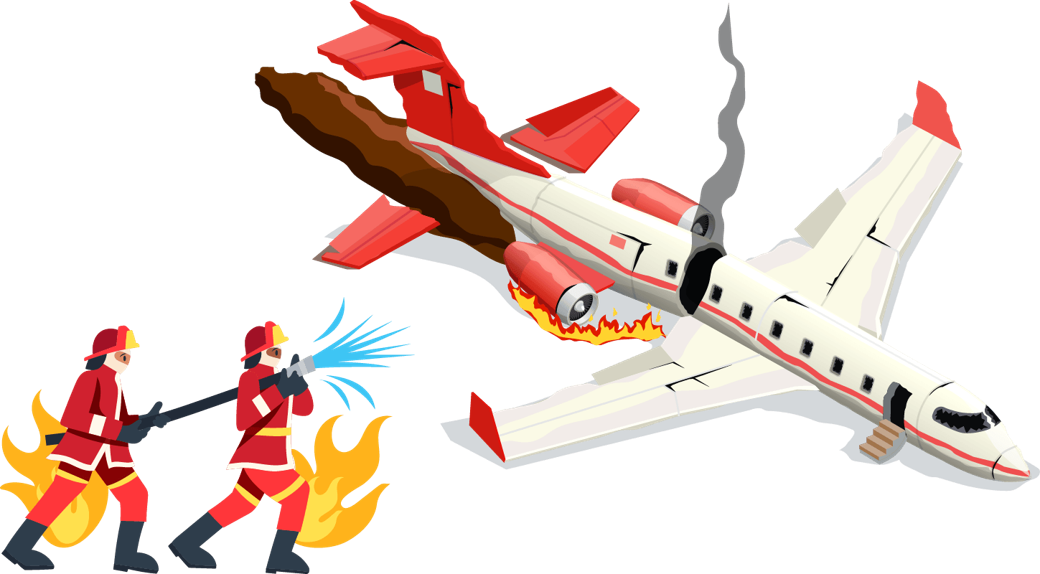
In this advanced course, participants will learn advanced firefighting tactics and strategies specific to aircraft rescue and firefighting operations.
Building upon foundational firefighting principles, students will delve into topics such as aircraft interior firefighting, foam application techniques, and ventilation strategies. Emphasis will be placed on developing strategic approaches to firefighting operations, optimizing resource utilization, and maximizing the effectiveness of firefighting efforts.
Through case studies and practical simulations, students will gain practical experience in applying advanced firefighting tactics to mitigate aircraft-related emergencies efficiently.

This course focuses on enhancing communication and coordination among ARFF teams, airport personnel, and external agencies during emergency response operations. Participants will learn about the importance of effective communication systems, incident command structures, and coordination protocols in ensuring a coordinated and cohesive response to emergencies.
Topics covered will include establishing command centers, conducting joint operations, and integrating response efforts across multiple agencies.
Through interactive exercises and tabletop simulations, students will develop the skills and confidence needed to effectively coordinate incident response activities and manage complex emergency scenarios.

This course focuses on enhancing communication and coordination among ARFF teams, airport personnel, and external agencies during emergency response operations. Participants will learn about the importance of effective communication systems, incident command structures, and coordination protocols in ensuring a coordinated and cohesive response to emergencies.
Topics covered will include establishing command centers, conducting joint operations, and integrating response efforts across multiple agencies.
Through interactive exercises and tabletop simulations, students will develop the skills and confidence needed to effectively coordinate incident response activities and manage complex emergency scenarios.

This course offers advanced training in aircraft extrication techniques, focusing on the safe and efficient removal of occupants from aircraft involved in emergencies. Participants will learn about vehicle stabilization, patient access, and extrication procedures specific to aircraft rescue scenarios.
Through hands-on simulations and practical exercises, students will develop the skills and confidence needed to assess and address complex extrication challenges effectively. Additionally, students will learn about the importance of teamwork, communication, and situational awareness in successful extrication operations.

In this course, participants will learn strategies for mitigating wildlife hazards at airports and minimizing the risk of bird strikes and other wildlife-related incidents. Students will gain an understanding of the factors contributing to wildlife hazards, including habitat attractants and bird behavior patterns.
Additionally, participants will learn about wildlife management techniques, such as habitat modification, bird deterrent systems, and wildlife population control measures. Through case studies and real-world examples, students will develop the knowledge and skills needed to assess and manage wildlife hazards effectively, ensuring the safety of aircraft operations and personnel.
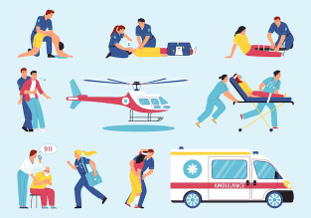
This course provides basic training in emergency medical procedures and protocols for ARFF personnel responding to aircraft emergencies. Participants will learn about patient assessment, CPR techniques, and first aid interventions commonly encountered in emergency situations.
Additionally, students will gain insights into the unique medical challenges posed by aircraft-related incidents, such as burns, trauma, and smoke inhalation. Through hands-on simulations and practical exercises, students will develop the skills and confidence needed to provide timely and effective medical care to individuals involved in aircraft emergencies, enhancing overall response capabilities.
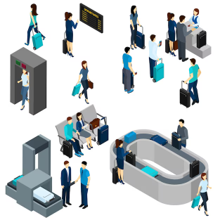
This course focuses on airport security protocols, access control measures, and threat assessment techniques to enhance security preparedness and response capabilities. Participants will learn about regulatory requirements governing airport security, including screening procedures, perimeter security, and access control systems.
Additionally, students will gain insights into emerging security threats and risk mitigation strategies. Through case studies and practical exercises, students will develop the knowledge and skills needed to assess security vulnerabilities, implement effective security measures, and respond to security incidents in the airport environment.

This course explores the behavior of fires in different environments and the principles of fire suppression, including fire chemistry, extinguishing agents, and firefighting tactics. Participants will learn about the factors influencing fire behavior, such as fuel type, ventilation, and thermal conditions.
Additionally, students will gain hands-on experience in using various firefighting agents and equipment to suppress fires effectively. Through practical demonstrations and live-fire exercises, students will develop the skills and confidence needed to safely and efficiently combat fires in aircraft-related emergencies.

This course provides training in aircraft crash investigation and analysis, focusing on the methods and techniques used to determine the causes and contributing factors of aircraft accidents. Participants will learn about the process of evidence collection, wreckage examination, and data analysis conducted during aircraft crash investigations.
Additionally, students will gain insights into the role of human factors, mechanical failures, and environmental conditions in aircraft accidents. Through case studies and practical exercises, students will develop the skills and knowledge needed to conduct thorough and systematic aircraft crash investigations, contributing to enhanced aviation safety and accident prevention efforts.

This course emphasizes leadership skills and team management principles specific to ARFF operations. Participants will learn about effective leadership styles, communication strategies, and conflict resolution techniques in the context of emergency response operations.
Additionally, students will gain insights into team dynamics, role clarity, and decision-making processes during high-stress situations. Through interactive exercises and scenario-based simulations, students will have the opportunity to practice leadership and team management skills in realistic emergency response scenarios, enhancing their readiness to lead and manage ARFF teams effectively.

This course is designed to develop proficiency in airport communication systems, emergency response protocols, and coordination procedures. Participants will learn about the various communication channels used in airport operations, including radio communications, telephone systems, and digital messaging platforms.
Additionally, students will gain insights into the importance of effective communication during emergency situations and the role of communication in coordinating response efforts across multiple agencies. Through interactive exercises and tabletop simulations, students will develop the skills and confidence needed to communicate effectively and coordinate emergency response activities in the airport environment.

Mericler is a Canadian educational umbrella under which a range of services is delivered worldwide by experts and professionals who have accumulated years of international experience in their specialty fields. Starting from Toronto, Canada...
20 Carlton St. (Suite
no. 121), Toronto,
Ontario, M5B 2H5,
Canada
+1 647 933 9098
+1 647 627 3938
+1 647 933 9097
info@mericler.net
Esentepe, Yazarlar Sk.
No 21, 34381
Şişli/İstanbul
+90 212 27 555 12/3
+90 544 294 46 38/9
info@mericler.net
8315 Spectrum Irvine
California 92618
+1 949 771 7214
+1 949 771 7214
info@mericler.net
Focus Education &
Immigration B-32
Supath-2 Opp. Hotel
Fairfield, Nr. Old
Wadaj Ashram Road,
Ahmedabad 380 013,
Gujarat, India
+91 97235 96061
+91 97235 96061
india@mericler.net
48 Sakponba road,
opposite First bank,
IK pharmacy building,
2nd floor, Benin city,
Edo state, Nigeria
+234 905 599 7001
+234 905 599 7001
nigeria@mericler.net